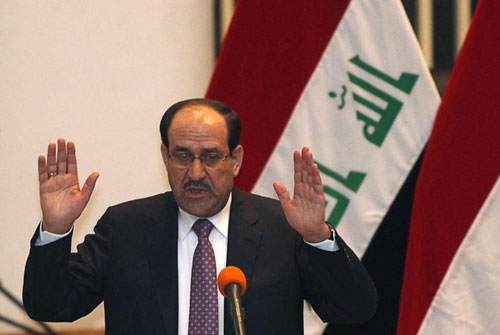-
News >World
Iraq approves new government with Maliki as PM
2010-12-22 10:38BAGHDAD - Iraq's parliament approved Prime Minister Nuri al-Maliki and his new government on Tuesday, nine months after an inconclusive election left politics in limbo and delayed investments to rebuild the country after years of war.

Iraq's Prime Minister Nuri al-Maliki speaks at the house of parliament in Baghdad December 21, 2010. [Photo/Agencies]
Lawmakers voted Maliki and a new multi-party slate of ministers into office, elevating Oil Minister Hussain al-Shahristani to deputy prime minister for energy, and leaving in place Kurdish veteran Foreign Minister Hoshiyar Zebari.
Highlighting the ethnic and sectarian divides that pervade the war-ravaged country, parliament had to postpone the vote on Monday after last-minute factional disputes and political horse-trading over posts delayed the government's formation.
As Maliki read out the chosen ministers' names one by one, parliament speaker Osama al-Nujaifi scanned the chamber for raised hands and said "approved by the majority" each time. The speaker did not ask for a show of hands from those opposing the candidate or abstaining from the vote.
In separate votes, parliament approved three deputy prime ministers as well as other cabinet ministers and the government's program. The government was then declared formed with Maliki as the prime minister.
Maliki acknowledged his ministerial list was not perfect.
"I do not say that this government, with all its formations, satisfies its citizens' aspirations, nor the political blocs', nor my ambition, nor any other person's ambition, because it is formed ... in extraordinary circumstances," he told lawmakers.
"This is what we have, and what we have could be better than what we had if we stand by our decisions," Maliki said.
Former Prime Minister Iyad Allawi, who failed to gain enough support for a majority after his cross-sectarian Iraqiya bloc won the most seats, told the assembly his Sunni-backed coalition would participate fully in the government.
Allawi, a secular Shi'ite, has said he will join the government as head of a new national strategic policy council.
Two female lawmakers protested at Tuesday's assembly against the absence of women in the new cabinet.
US President Barack Obama, whose predecessor George W. Bush led a military invasion of Iraq in 2003 that overthrew dictator Saddam Hussein, praised the formation of the new cabinet.
"Their decision to form an inclusive partnership government is a clear rejection of the efforts by extremists to spur sectarian division," he said.
Obama and Vice President Joseph Biden, the US administration's point person on Iraq, each called Maliki to congratulate him, according to a White House statement. Biden also congratulated Allawi.
The United States formally ended combat operations in Iraq at the end of August, and there are just under 50,000 troops left in the country. The remaining soldiers are expected to withdraw by the end of 2011.
Fragile Deals
Maliki has yet to decide on permanent choices for 11 positions, including sensitive security-related ministries such as defense and interior. Acting ministers were put in charge.
The prime minister promoted deputy oil minister Abdul Kareem Luaibi to minister and made prominent Sunni leader Rafie al-Esawi finance minister.
"The deal the parties worked out is rather elaborate but the critical thing is that they were able to get to this point through peaceful negotiations without any return to large-scale violence," said Shadi Hamid, director of research at the Brookings Doha Center.
"That said, power-sharing deals like this one tend to be quite fragile and so the next few months will present a crucial test for the rival blocs."
International investors are watching developments in Iraq's energy sector with great interest as the country embarks on an ambitious program to exploit its vast oil resources and rebuild its neglected and damaged infrastructure after decades of war and international economic sanctions.
While Shahristani was minister, the oil ministry reached a series of deals with oil majors that could boost Iraq's output capacity to 12 million barrels per day, rivaling global leader Saudi Arabia, from about 2.5 million barrels per day now.
For oil companies, Shahristani's continued control over the oil sector and Luaibi's promotion will be seen as assurance that contracts they agreed will be honored in the absence of formal guarantees, since Iraq still lacks a new hydrocarbons law.
A power-sharing deal on Nov 10. between Shi'ite, Sunni and Kurdish blocs put Maliki on track for a second term as prime minister. The pact returned Kurd Jalal Talabani as president and made Nujaifi, a Sunni, parliament's speaker.
Eman Ragab, an Iraq expert at Cairo's Al Ahram Center for Political and Strategic Studies, said the new government would not be granted a honeymoon period due to public impatience after nine months of stalemate.
"The new government will not be allowed the luxury of taking months to form a plan and years to implement it. People want fast solutions for the provision of social services and addressing the challenge of security," she said.
